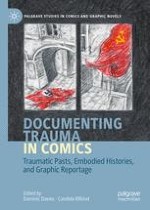2020 | OriginalPaper | Buchkapitel
14. Discourses of Trauma and Representation: Motherhood and Mother Tongue in Miriam Katin’s Graphic Memoirs
verfasst von : Eszter Szép
Erschienen in: Documenting Trauma in Comics
Verlag: Springer International Publishing
Aktivieren Sie unsere intelligente Suche, um passende Fachinhalte oder Patente zu finden.
Wählen Sie Textabschnitte aus um mit Künstlicher Intelligenz passenden Patente zu finden. powered by
Markieren Sie Textabschnitte, um KI-gestützt weitere passende Inhalte zu finden. powered by
